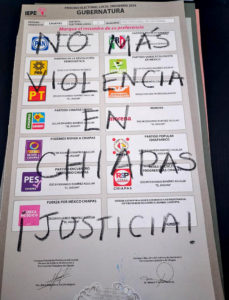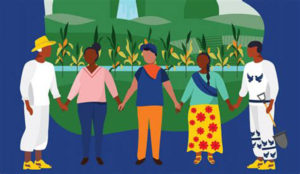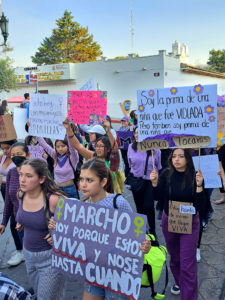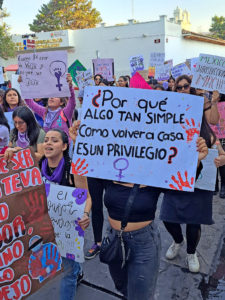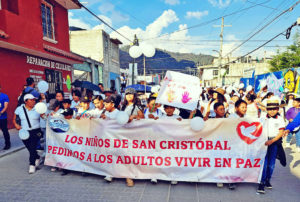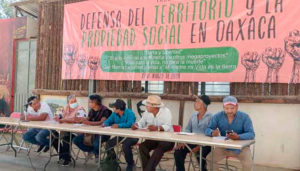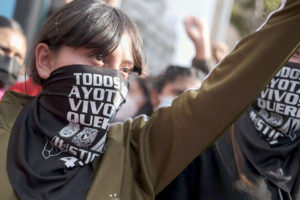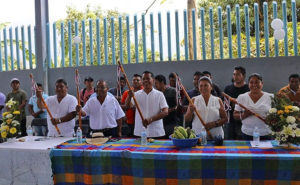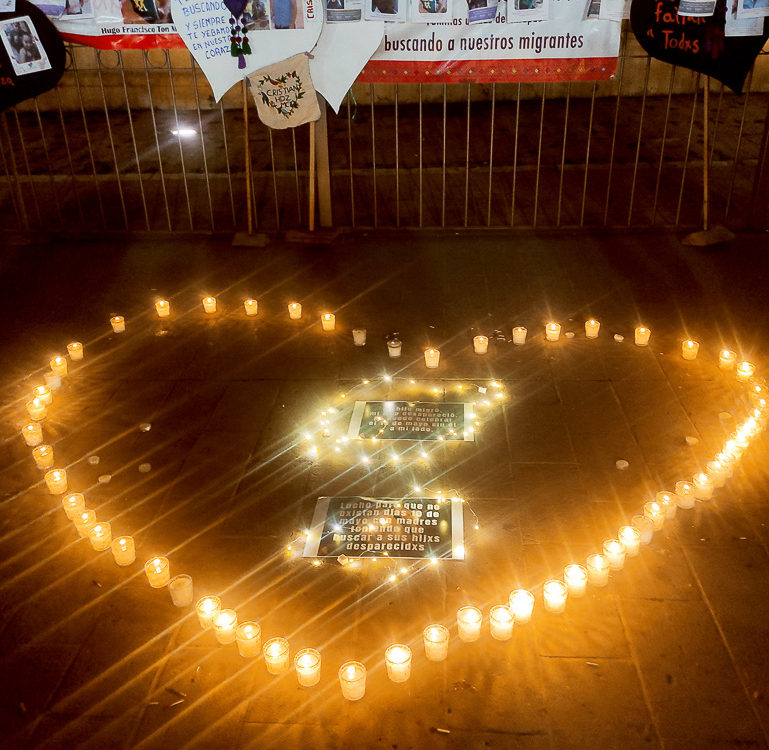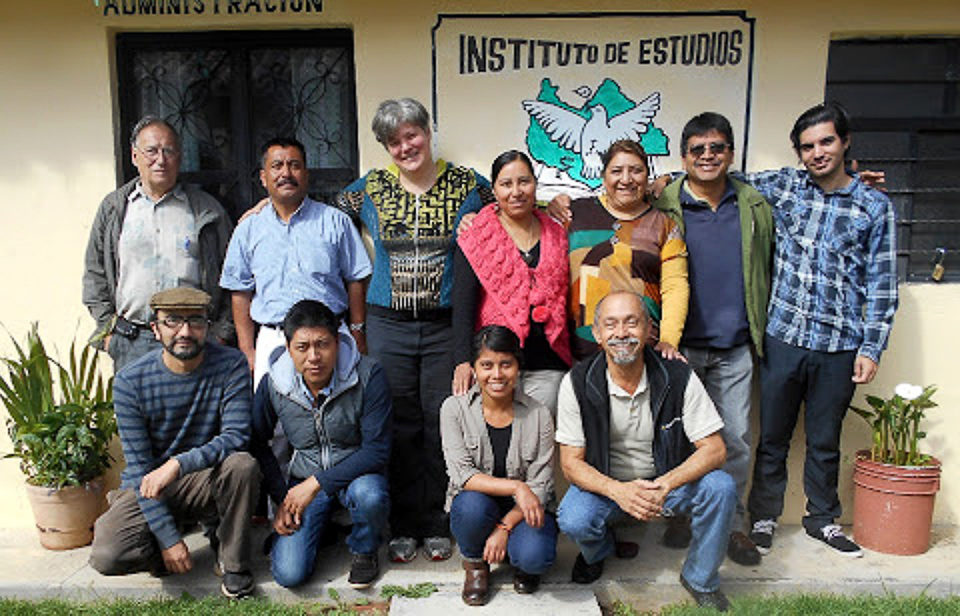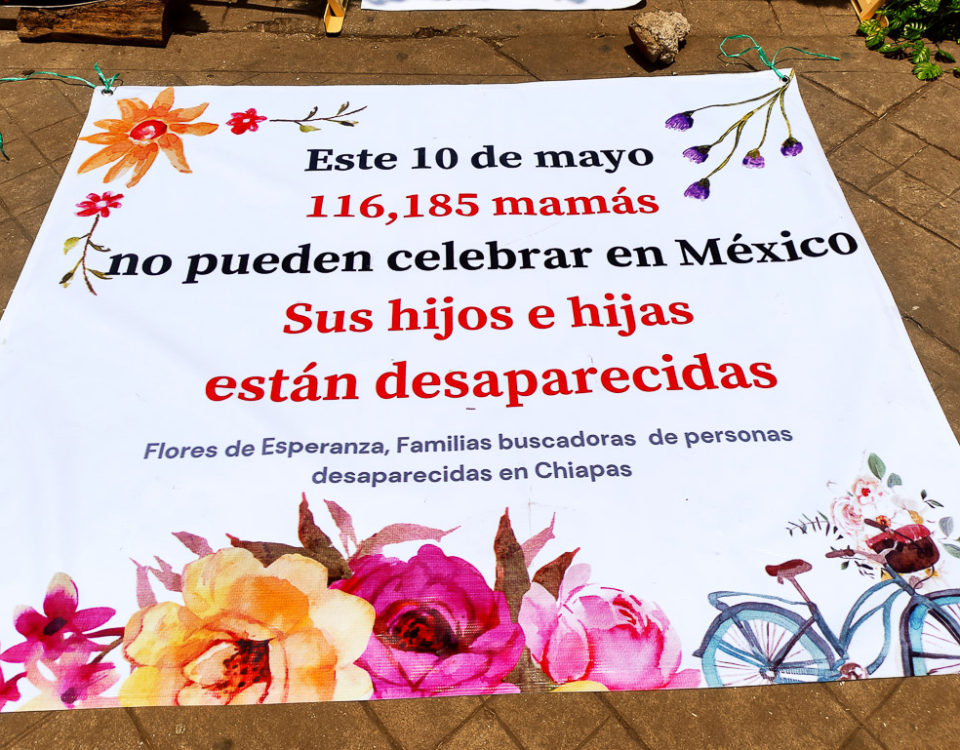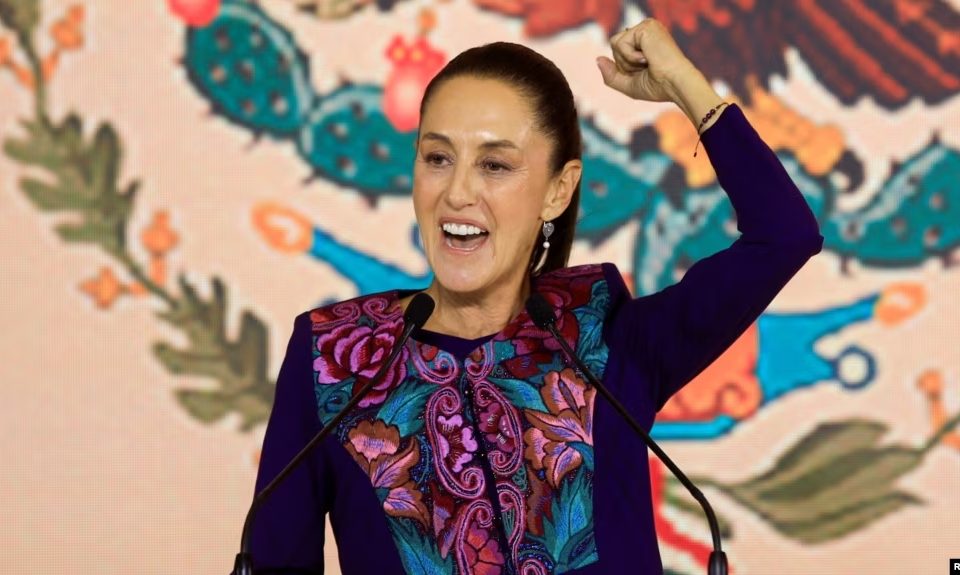
SIPAZ Activities (mid-November to mid-February 2024)
22/03/2024
SPECIAL: 2024 Elections
30/06/2024
I n March, the High Commissioner for Human Rights of the United Nations (UN), Volker Türk, said that the electoral process underway in Mexico “must be safeguarded from violence.” On June 2nd, these elections will lead to the appointment of more than 20,000 public officials, including the head of state, as well as members of both chambers of Congress and a wide range of representatives and state and local authorities.
President Andres Manuel Lopez Obrador (AMLO) minimized the risk, stating that “fortunately there is nothing serious.” He stated that “the High Commissioner is very (with all due respect), very biased; he is against us and joins forces with those who want to show that Mexico is a very violent country. You see what our adversaries do and the means of manipulation.” Lopez Obrador denounced that “there is that environment” in which his “adversaries” promote the narrative “of violence, insults to journalists and candidates, that is, seeking to strain” the atmosphere and talk about “state elections.”
Shortly before the elections, there were already more than 500 candidates who had federal protection, being escorted by more than three thousand elements of the Armed Forces. The authorities recognize that 15 candidates have been murdered since the beginning of the electoral process, although the citizen organization Data Civica counted 30, while the consulting firm DataInt documents 39 and a total of 149 political murders when considering advisors, officials and family members. The government also announced that on election day the country would be guarded by more than 260,000 members of the Armed Forces and the National Guard.
In April, Data Civica, Mexico Evalua and Animal Politico presented a new study titled “Democracy Violated: Organized Crime in Elections and in Public Administration in Mexico.” They conclude that political-criminal violence in Mexico not only affects parties and candidates, but that violence against all types of political players causes citizen participation to drop by three percentage points. Likewise, for every attack on candidates, the absence of polling station officials increases almost 1%. The study confirms that political-criminal violence is more frequent at the municipal level: 77% of victims aspired to or held a position at that level of government. “The interest of criminal organizations is at the local level, since this is how they build their territorial controls: locality by locality, to consequently control municipalities and entire regions,” the study states.
Violence in Mexico: Disagreements over Diagnosis

Meeting of the Episcopal Conference of Mexico with presidential candidates, CDMX, March 2024 © la-lista.com
In March, the Conference of the Mexican Episcopate (CEM) met with the three presidential candidates in the 2024 elections, Claudia Sheinbaum, Xochitl Galvez and Jorge Alvarez Maynez to sign the “National Commitment for Peace.” This document includes 117 proposals on security, justice, human development and human rights, which were developed through forums in the states in which more than 18 thousand people participated in 2023. It seeks to “build a route to effectively address effective collective action that can address the crisis of violence and social decomposition that afflicts our nation.” With reservations from the MORENA candidate Claudia Sheinbaum, the three candidates for the Presidency of Mexico signed the agreement to seek peace if they win the election. Sheinbaum’s disagreements stem from the fact that she does not share the diagnosis included in the document.
“I come to commit myself not only in a personal capacity, the Citizen Movement takes up this document and our candidates (…) are going to be forced to support this vision of a change in strategy, a change in the security model that the country urgently needs. We need to get out of this horror and I congratulate this effort to begin that path,” the candidate of the Citizen Movement, Alvarez Maynez, said. He acknowledged that he is not ahead in the electoral preferences and described it as worrying that the two leaders have been part of the failed strategies.
The candidate of the Strength and Heart for Mexico (PRI-PAN-PRD) coalition, Xochitl Galvez, declared that, “it finds a perfect harmony and coincidence with what I have been saying during the days we have been campaigning, and 15 security proposals and for me the most important is the demilitarization of the public administration.”
The presidential candidate for MORENA, PT and Green Party, Claudia Sheinbaum, listed several points on which she disagrees: the “pessimistic” diagnosis, “the references to an alleged militarization or militarism in the country, and with the points where minimizes or relativizes the function of the State” or the fact that “common crime has increased in Mexico, fueled by marginalization and the search for recognition and social justice.” The next day, AMLO declared “of course I respect the churches a lot, but politically I do not agree that they want to create an environment that does not exist.”
Multiple Pending Issues in Human Rights
In April, the Mexican Center for Environmental Law (CEMDA) published its 2023 report on the situation of environmental human rights defenders, in which it revealed that 20 people with this profile were murdered last year. There have 102 environmental defenders murdered during the current six-year term of office. In this same period, 282 attacks were recorded against 416 people and communities defending environmental human rights, in a total of 123 different incidents. The main aggressor was the government, having a participation in 61 of the 123 events, followed by organized crime, with 37 cases, and private companies, with 19. Regarding the 18 cases related to megaprojects and works related to highways communication, all were for the authorization of railways. Of these, 12 incidents are related to the “Maya Train” megaproject and six to the Tehuantepec Isthmus Interoceanic Corridor. 57.7% were against indigenous people.
In April, the All Rights for All Network (Red TDT), rejected “the criminalization carried out by President AMLO in his morning press conferences to delegitimize the Fray Bartolome de Las Casas Center for Human in Chiapas and the Miguel Agustin Pro Juarez Human Rights Center in Mexico City.” “This discourse aggravates reality, since Mexico continues to be one of the most dangerous countries for journalism and the defense of human rights. According to the UNHCHR, between January 2019 and February 2024, at least 103 murders of human rights defenders, 41 journalists, seven media workers have been recorded in possible relation to their work; additionally, 38 defenders or journalists were disappeared, 25 regained their freedom and 13 are still missing,” it denounced. Shortly before, AMLO said of the two organizations “you are seeking to create an environment of violence, which does not have the dimensions that you are registering.”
According to the National Militarization Inventory, there have been at least 291 occasions in which the three levels of government have transferred civilian functions and budgets to the armed forces between the years 2006 and 2023. This, through two constitutional reforms, 12 federal legislative reforms, 19 presidential decrees and agreements and 258 private agreements signed between the armed forces and federal, state and municipal civil authorities. The Inventory concludes that AMLO’s government is the one that has militarized Mexico the most since 83% of agreements with armed forces have not had to do with security. The Inventory documents the signing of 19 military agreements issued in the current six-year term of office. The majority create state-owned companies under the control of the armed forces and allow them to participate in priority government works, such as the Maya Train. The Inventory argues that militarization is problematic: “First, because it is a process that goes against the Constitution. Second, because the armed forces are managed under a special regime and, therefore, are not subject to the same obligations and controls as civil institutions (…). Third, because empirical evidence from Mexico demonstrates that the participation of the armed forces in public security tasks has not only failed to contain violence, but has contributed to exacerbating it.”
CHIAPAS: Between Electoral and Criminal violence
In May, the bishops of Chiapas expressed their concern about the situation in some regions of the state affected by violence generated by organized crime groups, where, they considered, there are not the conditions to carry out the elections. They spoke about “the wave of violence present in our dioceses, which destabilizes society and which is often generated by organized crime; the presence of corruption at all levels of government, which generates so much damage to the well-being of communities and families.” Likewise, they identified other challenges, such as migration, payment of extortion, insecurity, widespread poverty, backwardness in education and health, lack of job opportunities and gender inequality. They also noted that candidates at all levels appear to lack concrete proposals to address these challenges. By that date, there were 15 attacks against electoral aspirants and candidates in Chiapas, of which four died.
Although black spots continue to multiply in almost the entire state, the areas with maximum levels of violence occur in the Border and Sierra regions. In April, the Fray Bartolome de Las Casas Center for Human Rights (Frayba) responded to accusations from President Lopez Obrador who accused said center of “magnifying” the violence in Chiapas. It reaffirmed that “with concern, we have confirmed and made visible that, at least since June 2021, the situation of violence has deepened like a cancer in our state, within the framework of the criminal dispute for control of the territory. This situation is characterized not only by armed confrontation between criminal groups, but also by the attempt to control, to a large degree through terror strategies, the social, economic and political life of the communities. Consequently, the Chiapas and mobile population is experiencing serious impacts, with emphasis on the Border and Sierra regions, with a trend of expansion to other regions of the state.”
The other, more serious incident occurred in May when eleven people were murdered in Nuevo Morelia, municipality of Chicomuselo, in the context of clashes between the Jalisco New Generation (CJNG) and Sinaloa (CS) cartels that intensified in the previous days. AMLO acknowledged that “that area has insecurity problems.” However, he assured that there were conditions for the elections to be held in Chiapas on June 2nd.
Impacts of Growing Violence
The levels of violence are having increasing impacts on the population. In February, Melel Xojobal warned about the fact that more than 2,507 children and adolescents from the Chiapas Highlands are at risk of being recruited by organized crime. It stated that the majority of victims of forced recruitment have an average age between 15 and 21 years and are indigenous. Once inside, the young people are forced to run errands, sell and transport drugs, recruit other people and carry out surveillance or coyote work. In the case of women, they are forced to do cleaning and be waitresses in canteens or bars, until they become victims of sexual exploitation. Also, young people can be forced to participate in confrontations against rival groups, as well as carry out gang activities or be hitmen.
In March, within the framework of International Women’s Day, thousands of women marched in different cities of Chiapas to demand justice for the victims of femicides and for an end to violence against women. According to figures from the state’s Gender Violence Alert (GVA), in 2023, 2,302 crimes were documented in investigation files. The majority corresponds to family violence (899), followed by pedophilia (387), rape (288), failure to comply with family assistance obligations (282), sexual abuse (154), sexual harassment (92), crimes against sexual privacy or bodily intimacy (52), and femicide (35), among others.
In April, Frayba presented its most recent report “Touching the Void”, whose objective is to carry out a first x-ray of the problem of disappearances, a phenomenon that has been growing exponentially in the state. “In 2019, a total of 68 missing people was registered, by 2022 the figure was 244 missing and year after year it has been increasing, in this period the phenomenon increased by 358%,” it specified (see Focus). In May, within the framework of Mother’s Day, thousands of mothers in Chiapas carried out symbolic acts demanding truth, justice and guarantees of non-repetition, in the face of forced disappearance, femicides and murders of their sons and daughters.
Complaints and Responses Facing an Adverse Context
Despite an adverse context, actions have been taken in favor of life, peace and security. In March, more than a thousand Tseltal indigenous people from the Community Government of Chilon marched to demand an end to the violence generated by political parties and criminal groups. They declared that they will continue to “build paths of life from our autonomy,” promoting “the collective over the individual” and fighting “for Mother Earth in the face of the extractive threat.”
In March, within the framework of World Water Day, residents and activists protested in San Cristobal de Las Casas in defense of water and life. They stated that “Mexico faces serious problems and challenges due to the lack of availability and quality of water for human consumption. The severe drought that is shaking us has multiple interconnected causes: climate change, deforestation, population growth, the lack of a culture of water care, the implementation of public policies that respond to the laws of the globalized market, a model of water management that gives rise to overexploitation, hoarding, contamination, dispossession and privatization of the vital liquid.”
In March, the Communal Property Authorities of the municipality of Nicolas Ruiz called on the surrounding towns to form an “Alliance for the Security and Good of our Territories.” They explained that “together we can take care of ourselves because we do not want more events like what happened on March 1st, 2024, when a group of people from organized crime entered our territory to carry out their illicit work.” They denounced that “the Mexican State is well aware of what is happening and we demand that it control its people because government institutions and high officials allow and protect the actions of these groups.”
In April, more than 300 people marched for peace and security in San Cristobal de Las Casas. This march was called after, a few days before, an eleven-year-old boy was kidnapped. Although the minor was rescued safe and sound by state police the night before the march, it was decided to go ahead with it. The protesters, many of them children from neighborhoods in the northern area, carried white flags and balloons. The case of the kidnapping of the minor is added to the 2,476 cases of girls, boys and adolescents who disappeared between 2018 and March 2024, of which 40% have not been located.
In April, Tsotsil Catholics from the municipality of Chalchihuitan made a pilgrimage to the capital of this municipality to demand the closure of canteens and that voting at the door “be done in peace, without weapons or violence; that the vote is free and secret.” More than a thousand participants joined in this pilgrimage “For Life and Peace.”
OAXACA: Concerns in and outside the Electoral Context
Although the levels of electoral violence are not comparable to that of other states, in April, the National Network of Indigenous Lawyers expressed its concern about the recent appointments of indigenous candidates since they observed a “utilitarian tendency of identity through qualified self-ascription.” It called on the electoral authorities to implement mechanisms to eradicate the usurpation and simulation that allows “opportunistic” people to occupy indigenous affirmative action. It assured that the majority of the candidates have no real connection with the indigenous communities, “they only placed themselves in that situation with the purpose of obtaining an improper candidacy to claim.” In Oaxaca, “under the protection” of affirmative actions, it explained that 233 people were registered; of which, 16 are older adults, 12 young people, 162 indigenous people, 29 Afro-Mexican people, 16 people of sexual diversity and 24 people with disabilities.
In March, the Forum for the Defense of Territory and Social Property was held in Santa Maria Atzompa. In a final declaration, the participants denounced “the growing attempts to privatize land, as demonstrated by the failed proposal of the MORENA state government (…) with the program for land certification, which due to pressure and disagreement had to throw it back; without this meaning that it will be the only and last attempt, considering the policy of imposing large megaprojects by private companies in collusion with the State.” They also denounced the “policy of looting and war of extermination against our native peoples and communities, our ways of life and organization,” indicating that looting policies are accompanied by social assistance programs, which promote individualism and destroy the community. They ratified that they will continue to build “resistance and organizational movements in search of defending and protecting our lands, natural assets, territories and preserving our traditional way of life.”
In April, eleven Zapotec communities in the Central Valleys organized in the No Mining Front for a Future for All reported that they achieved the outright suspension of mining concessions in their territories, affected by the Fortuna Silver Mines (FSM) mining project in San Jose del Progreso. They recalled that in itself “our decisions are expressed in our declarations of prohibited territory for mining.” They denounced that “far from recognizing, respecting and guaranteeing our rights, both levels of government tried to promote mining in our territories, violating our right to self-determination.”
In March, within the framework of International Women’s Day, hundreds of women marched in Oaxaca to demand justice for cases of raped, missing or murdered women in the state. According to the registry of the “Rosario Castellanos” Women’s Studies Group, 126 women have died victims of femicide since the beginning of the administration of Governor Salomon Jara in 2022. Prior to the demonstrations, women’s organizations and groups denounced the “stigmatization campaign and criminalization against protests and marches (…). We condemn the construction of a narrative that points to, accuses and judges women who, in their legitimate right to protest, will take to the streets today to denounce the femicidal violence that has increased under the protection of the State.” They expressed their concern because “feminist collectives and groups are targeted and singled out—even those organizations where children will participate—in order to confront them with citizens.”
GUERRERO: State with Highest Number of Victims of Political Violence
So far in the 2024 electoral process, by mid-May, Guerrero was positioned as the state with the highest number of victims of political violence, registering at least 80 cases. Among the murdered people are Ricardo Taja, candidate for the municipal presidency of Acapulco, and Tomas Morales Patron, candidate for the municipal presidency of Chilapa, both from MORENA. Jaime Damaso Solis, candidate for the municipal presidency of Zitlala for the National Action Party, has also been murdered; Marcelino Ruiz, candidate for the municipal presidency of Atlixtac for the Party of the Democratic Revolution; and Alfredo Gonzalez, candidate for the municipal presidency of Atoyac for the Labor Party. The municipalities of Taxco, Chilpancingo and Coyuca were those in which the most attacks have been recorded. Likewise, 22 municipalities reported cases of political gender violence, affecting both men and women.
During the period, there has also been greater frustration and despair due to the lack of progress in the case of the forced disappearance of the 43 students in Ayotzinapa in 2014. In March, a group of students from Ayotzinapa forcibly broke down one of the doors of the National Palace. The students were in the main square of Mexico City along with relatives of the 43 missing people in protest against the lack of responses from the government about the case. The fathers and mothers of the 43 student teachers recalled that Lopez Obrador promised in his presidential campaign to conclude the Ayotzinapa Case, but months before the end of his administration he has not fulfilled it and, on the contrary, announced that it will not be resolved in this six-year term of office.
In March, Yanqui Kothan Gomez Peralta, a student from Ayotzinapa, died and another was injured: the police opened fire when they did not stop when passing through a checkpoint. The Secretary of Public Security of Guerrero described what happened as “a fortuitous event.” La Montaña Tlachinollan Human Rights Center declared: “given a serious violation of human rights, the minimum that a government that calls itself democratic should do is guarantee an objective, impartial investigation, proceeding to protect the crime scene and make it available to the competent authority to the police. They did the opposite, they let the police put together their own version of the events and let their superiors endorse their criminal actions. (…) With their fallacious version they encourage the media lynching against the student teachers. They incite violence and harsh positions. They focus their attack on the student teachers, placing them as the causes of chaos and violence, when the perpetrators of serious human rights violations are agents of the state.”
In more hopeful factors, in April, the Me’phaa people of the municipality of Malinaltepec inaugurated a new indigenous security and justice system based on autonomy, self-determination and the recognition of town authorities. The so-called Indigenous Territorial Security and Justice System (SERTI) will seek to consolidate itself in the face of the threat of criminal organizations taking over the lives of people, against the installation of mining companies and in the face of the governance crisis in the region.

